UN Experts Urge Iran To Stop Issuing Death Sentences For Protesters
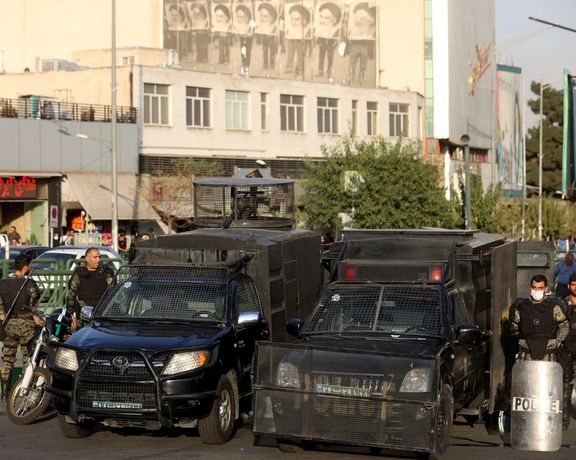
A group of experts at the United Nations have urged Iranian authorities to stop indicting protesters with charges punishable by the death penalty.

A group of experts at the United Nations have urged Iranian authorities to stop indicting protesters with charges punishable by the death penalty.
Sixteen UN-appointed independent human rights experts urged the Iranian government in a statement on Friday to stop using the death penalty as a tool to squash protests.
“We reiterate our call to immediately release all protesters who have been arbitrarily deprived of their liberty for the sole reason of exercising their legitimate rights to freedom of opinion and expression, association and peaceful assembly and for their actions to promote and protect human rights and fundamental freedoms through peaceful means,” they said in the statement.
Eight people were charged on October 29 in Tehran with crimes carrying the death penalty, namely “waging war against God” or “moharebeh” and “corruption on earth”. Two days later, the Tehran prosecutor announced that some 1,000 indictments had been issued in connection with recent “riots” in Tehran province alone.
Earlier, a group of 227 parliament members in Iran called on the Judiciary to issue death sentences for some people arrested during the ongoing antigovernment protests.
“With the continuous repression of protests, many more indictments on charges carrying the death penalty and death sentences might soon be issued, and we fear that women and girls …might be particularly targeted”, warned the UN experts.
Since September 16, authorities have detained thousands of protesters, including many women, children, youth and at least 51 journalists, 37 of whom remain in jail – many incommunicado.

German Chancellor Olaf Scholz has slammed government violence against Iranian protesters calling for a new round of EU sanctions on the Islamic Republic next week.
“We want to continue to step up the pressure on the IRGC and the political leadership,” the German chancellor said in a video posted on Twitter.
Criticizing the clerical regime he said in the video, “What kind of a government are you that shoots at its own citizens? Anyone who acts like this must count on our resistance.”
His comments were in response to Iranian Foreign Minister Hossein Amir-Abdollahian who earlier criticized Germany’s Foreign Minister Annalena Baerbock for denouncing Iran’s crackdown on demonstrators.
Iran’s government reacts to any criticism of its human rights violations by accusing other countries and international organizations of interfering in its internal affairs. All top officials of the Islamic Republic have claimed that the ongoing protests were organized by “enemies,” generally meaning the United States and its allies. Some officials have even threatened Saudi Arabia for allegedly supporting media reporting on the protests.
Amir-Abdollahian tweeted Thursday that “Undermining old ties has long-term consequences and Germany can choose engagement to address shared challenges or confrontation,” adding that “Our response will be proportionate and firm.”
However, Scholz said, “The Iranian government is solely responsible for the explosion of violence.”
“We must pay heed and take action when human rights are violated. We are witnessing the Iranians’ brave fight for greater freedom and justice, and the brutal violence against them. Sanctions are one way in which we are stepping up the pressure on the regime," reiterated the German chancellor.
The latest estimate by an Iranian human rights organization based abroad put the number of protesters killed by security forces at 326, including 43 children. Thousands have also been arrested by the government has not released any figures.
Scholz said the ongoing protests sparked by the Sept. 16 death of 22-year-old Mahsa Amini following her detention by Iran’s morality police were no longer “merely a question of dress codes” but had evolved into a fight for freedom and justice.
Scholz further mentioned that “We see the struggle for freedom and justice, and we see Iranian drones attacking and killing Ukrainians. All of this is totally unacceptable.”
He restated that there should be further EU sanctions against Iran. “Words alone were not enough in view of the brutality and contempt for human beings,” underlined the German chancellor.
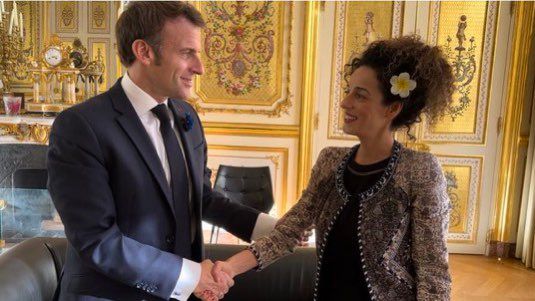
French President Emmanuel Macron has met Iranian female activists and has hailed the protests in Iran against the Islamic Republic, calling it a “revolution”.
During a meeting with a delegation of exiled female Iranian rights activists, the French president said, “We welcomed with great honor and pleasure a delegation of Iranian women,” adding “I want here to really emphasize to them again our respect and our admiration in the context of the revolution they are leading.”
According to the Elysee, the delegation included US-based activist Masih Alinejad, Shima Babaei, and Ladan Boroumand, the co-founder of a Washington-based rights group.
After the visit, Masih Alinejad wrote in a tweet that “France can be the first country to officially recognize this revolution. France must meet the Iranian opposition instead of regime officials and to prepare the EU for a secular Iran.”
She also noted that “I attended this meeting with a delegation of Iranian women in order to present a clear image of the regime’s crimes,” stating that Roya Piraei, whose mom was killed in the revolution, told Macron not to shake hands with Iranians’ killers.”
On Thursday, Masih Alinejad also announced the start of the “The World Liberty Congress” which she said founded with former world chess champion Garry Kasparov and Leopoldo Lopez, two activists opposing the governments of Russia and Venezuela.
Nine weeks into the uprising of the Iranian people against autocratic clerical rule, well over 300 people, including 41 children and 24 women have been killed by security forces.
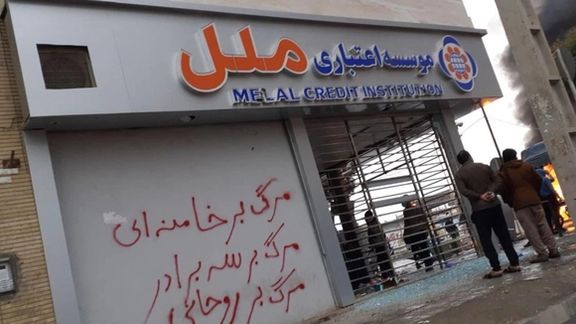
Anonymous activists in Iran have set Tuesday as commemoration day for 1,500 people killed by security forces in November 2019, calling for large demonstrations.
At the same time, activists abroad have also issued calls for commemoration protests in many cities, spanning from Australia to North America at the end of the month.
A joint call by the Youth of Tabriz, Zanjan, Esfahan, Mashhad, Ahvaz, Gorgan and Babol has urged people to pour into the streets “on the anniversary of the killing of the youths in November 2019,” on November 15.
“We will start from high schools, universities and markets and continue with neighborhood-centered gatherings to move to main squares of cities,” read part of the statement.
A series of nationwide protests in Iran, sometimes known as Bloody November, took place in 2019. Initially triggered by a 50–200% increase in fuel prices, the demonstrations quickly turned to calls for the overthrow of the government in Iran and Supreme Leader Ali Khamenei. As many as 1,500 Iranian protesters were killed mostly by gunfire of security forces in less than a week.
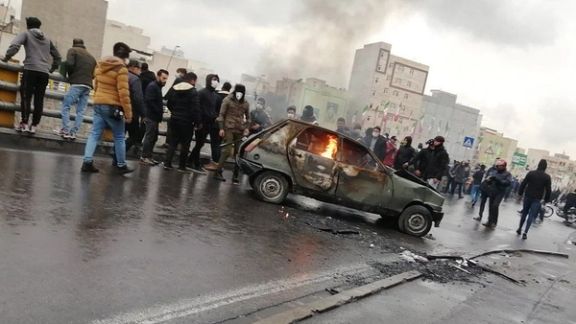
The anonymous youth groups have been issuing calls for protests since popular demonstrations began in September. It appears there is no central leadership organizing the people, but there are possibly links among activists in various parts of the country. The absence of a central leadership has perhaps protected the movement against the government’s ability to arrest and hold individuals indefinitely, but at the same time lack of a clear leadership poses its own problems.
So far well-over 300 protesters have been killed and thousands arrested, although the government has not issued any figures.
Earlier, the Association of Families of Flight PS752 Victims announced that a large march would also be held in different cities of the world on Saturday, November 28.
On January 8, 2020, the Islamic Revolutionary Guard (IRGC) shot down Ukraine’s International Airlines Flight 752 flying from Tehran to Kyiv shortly after takeoff, killing all 176 passengers and crew aboard. Iran never presented a convincing reason for its callous act and tried to withhold information about the incident. Dozens of victims were Canadian citizens or permanent residents.
Since the current uprising began against Iran’s clerical regime almost eight weeks ago, the airliner victims’ association has organized large gatherings called, "The Time Has Come" all over the world; including a 100,000-strong march in Berlin and human chains in 80 cities worldwide.
Meanwhile, an anonymous group called “Youth of Lorestan Neighborhoods” also called for protests on Saturday at 5:00 PM in Iran’s western province.
Since the eruption of protests following the death of Mahsa Amini in police custody, numerous calls have been issued by groups, institutions, guilds, and associations for demonstrations, gatherings, and strikes.

An increasing number of Iranian lawmakers and former politicians blame the government, not foreigners for the nationwide uprising that has entered its 8th week.
Government officials in the core of the regime and military commanders in Iran keep blaming foreign countries and their alleged agents for instigating unrest in Iran.
Meanwhile, conservative political activists have joined their reformist counterparts in condemning 227 lawmakers who have called for death sentences for detained protesters.
Wahab Azizi, a conservative activist told Iranian Labour News Agency (ILNA) on Friday that “The protests are deep-rooted and have several reasons. You cannot attribute them to the actions of enemies. Protests started in 2009 and have continued in different forms since then.”
He added that the parliament and other parts of the Iranian government have still not realized the nature of the protests. He added: “Protests could be handled and controlled quickly if they have only economic or even political causes, but the protests that have cultural and social reasons should be addressed in a convincing way.”
Condemning his colleagues who called for death sentence for detained protesters, Azizi said: “Such uncalculated remarks have created the current crisis in Iran.”
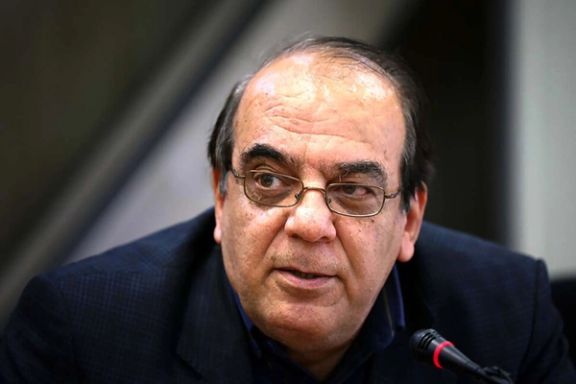
Meanwhile reformist commentator Abbas Abdi wrote in a tweet: “The lawmakers who have been elected with a minimum number of votes thanks to the Guardian Counci’s vetting were not expected to behave otherwise.” Abdi was referring to wholesale disqualification of hundreds of candidates in the 2020 parliamentary elections that led to the current hardliner majority in the legislature.
Azizi pointed out that labeling the protests as riots will make no difference in its nature as the denial of a reality will not eliminate it. Trying to sort out the problem by issuing orders will only widen the gap between the people and the regime. “If officials blame the protests on enemy infiltrators, they should know that even if that is true, it is because of their own inefficiency,” Azizi said.
In another development, lawmaker Jalil Rahimi Jahanabadi posted a picture of hardliner newspaper editor Hossein Shariatmadari next to a tweet in which he said, “We should look for infiltrators among the hardliners.” He said Shariatmadari’s recent article in which he called on the police and IRGC to use combat ammunition to shoot protesters was tantamount to pouring gasoline on fire.
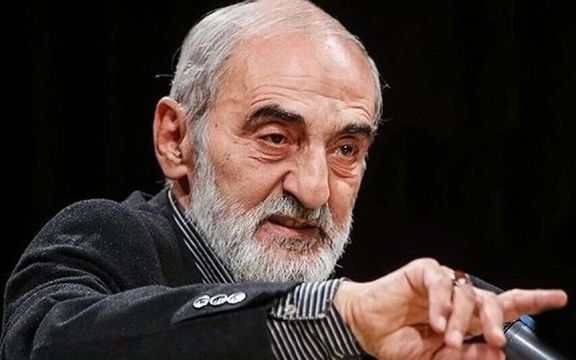
Jahanabadi, a member of the Iranian Parliament’s committee for national security, further called on intelligence agencies to keep an eye on the remarks made by hardliners who pretend to be super revolutionaries.
Meanwhile, conservative lawmaker and former intelligence officer Mohammad Hassan Asafari criticized a comment by government Spokesman Ali Bahadori. Speaking at a university earlier this week, Bahadori said that security forces could have easily shot the protesters with combat ammunition rather than hitting them with shotguns.
Asafari advised the spokesman that the situation needs to calm down and his uncalculated remarks had the opposite effect.
The commander of the army’s ground forces, Kiumars Haydari had also made some annoying remarks about harsher measures against the protesters and called them “flies”. Reformist commentator Sadeq Zibakalam told the government spokesman in a tweet on Friday: “Haydari is a military man and does not know about civil society, the law and people’s rights so he calls them flies. But you as someone who has studied law were not expected to threaten the people.”

Germany and Iceland submitted a request on Friday on behalf of dozens of countries to hold a special session at the UN Human Rights Council on the ongoing protests in Iran later this month.
According to the letter signed by the two countries' ambassadors., the request called for the session "to address the deteriorating human rights situation in the Islamic Republic of Iran, especially with respect to women and children."
At least one-third of the UN Human Rights Council's voting members backed the proposal, as is required for meetings outside of the body's normal agenda, meaning its convening is a formality.
According to the German diplomatic mission in Geneva, dozens of others also signed up, bringing the total number of backers to 44.
Earlier in the day, the Islamic Republic’s foreign minister warned the UN Human Rights Council over organizing any session to discuss the situation.
Alleging that the Islamic Republic has "deeply exercised restraint" in the ongoing unrest – which has left over 300 protesters dead and about 15,000 detained, Hossein Amir-Abdollahian told UN Secretary General Antonio Guterres that such a meeting should be held for countries that "promote violence and terror."